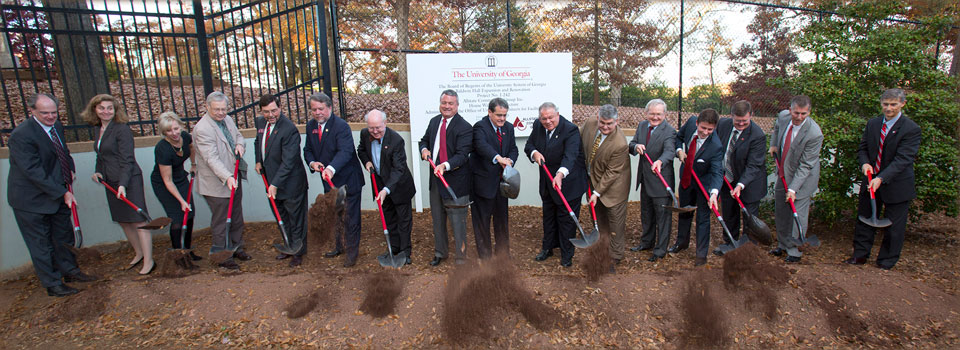University of Georgia administrators, students and state legislators took shovels to ground in December to mark the beginning of a project that will expand and renovate the historic Baldwin Hall.
The roughly $8 million project, with funding approved by the Georgia General Assembly, includes construction of a 10,800-square-foot Baldwin Hall Annex and renovations to the existing building. Work on the addition is slated to begin in June and run through May 2016. Renovations are expected to be complete in September 2016.
Built in 1938, Baldwin Hall has served as a Navy pre-flight school during World War II and home to several UGA academic programs. The building currently houses the School of Public and International Affairs as well as the departments of sociology and anthropology in the Franklin College of Arts and Sciences.
“Some of the most salient questions regarding our democracy, our national security and our evolving global society are examined through the academic programs housed in Baldwin Hall,” said UGA President Jere W. Morehead.
“The University of Georgia and the state of Georgia benefit profoundly from the academic work that is performed here every day, and we are excited about this opportunity to enhance Baldwin Hall so that these programs may reach new heights of excellence in teaching, research and service.”
The Georgia General Assembly was represented at the groundbreaking by David Ralston, speaker of the Georgia House of Representatives; David Shafer, president pro tempore of the Georgia state Senate; Rep. Terry England (R-Auburn); Rep. Earl Ehrhart (R-Powder Springs); and Rep. Chuck Williams (R-Watkinsville).
When it was established in 2001, about 450 students were pursuing degrees in the School of Public and International Affairs. By this fall, that number has tripled to more than 1,500, and demand for classroom and meeting space exceeds the facility’s current capacity.
The new annex will provide the school with technology-enabled active learning classrooms; space for graduate teaching assistants to hold office hours with undergraduate students; and common areas for faculty, staff, students and alumni to convene for academic discussions, presentations and events. The existing building will be renovated to provide academic departments with modern instructional facilities, greater accessibility for individuals with disabilities and a more efficient mechanical system.
